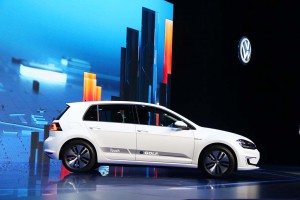Tesla CEO Elon Musk said recently that he expected the company’s power storage operations to grow twice as fast as the automotive business for some time going forward … and now Volkswagen’s helping to prove him right.
Volkswagen AG’s subsidiary, Electrify America, plans to install Tesla battery storage, better known as Powerpack systems, at more than 100 charging stations across the United States to help keep costs down for drivers who may have to charge their electric vehicles during peak load times.
Electricity users can incur high-demand charges from many U.S. utilities when they draw a lot of energy from the grid in a short time, which can happen charging an electric vehicle or a number of them at once at a single station.
“If you pass the demand charge onto the customer in a high-demand charge market” it can cost anywhere from $70 to $110 to charge a vehicle, Electrify America’s Chief Operating Officer Brendan Jones told Reuters. “If you did that, obviously nobody would buy an electric vehicle.”
(Electrify America set to expand U.S. charging structure. Click Here for the story.)
The plan is for Tesla’s powerpacks to draw power during low usage (i.e. lower cost) rates and store the energy for VW and other electric vehicle owners who need to recharge at higher use or “peak” hours without the “peak hour” expense.’
Electrify America is a company born out VW’s need to make amends, financially and spiritually, for the diesel emissions scandal from 2015. Part of the $2 billion it paid in fines and fees is going toward Electrify America’s installation of charging stations around the country.
(Click Here for more about the challenges mass EV charging presents.)
A lack of EV recharging infrastructure is seen as a major barrier to mass adoption as consumers remain concerned over their limited range. By this June Electrify America will have 484 charging stations built across America. The company is discussing using more battery storage packs with regulators for its next round of infrastructure investment, company CTO Jones said.
VW has agreed to spend $2 billion nationwide on clean car infrastructure as part of an agreement with federal regulators after admitting to diesel emissions cheating. A lack of EV recharging infrastructure is seen as a major barrier to mass adoption as consumers remain concerned over their limited range.
(BCG study forecasts 50% of vehicles sold in 2030 will be “electrified.” For the story, Click Here.)
Global automakers are planning a $300 billion surge in spending on electric vehicle technology over the next five to 10 years, with nearly half of the money targeted at China, accelerating the industry’s transition from fossil fuels and shifting power to Asian battery and electric vehicle technology suppliers.

